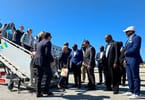It took a total of 16 agonizing days of finger-pointing among government officials in Washington, DC, but the US government shutdown is finally over. The days of high anxiety over the possibility that America could default on its debt ended late Wednesday, October 16, when Senate Majority Leader Harry Reid of Nevada and his minority counterpart Mitch McConnell of Kentucky reached an agreement to fund the United States government through January 15 of next year and to give the nation sufficient borrowing authority to last through February 7.
The accord was reportedly approved on an 81 to 18 vote in the U.S. Senate at 8:15 p.m. EST. The House followed two hours later, approving the temporary spending bill and debt limit increase, by a vote of 285 to 144. Democrats in the House accounted for 198 of the yes votes, which puts federal employees back to work as early as today, October 17.
Despite opposition from a majority of House Republicans, the accord restores “funding for veterans programs, the national parks, Head Start and nutritional assistance, and a myriad of other federal programs on hold since the October 1 beginning of the fiscal year.”
In travel and tourism terms, this means the resumption of travel-related activities, which the U.S. Travel Association claimed translated to a loss of $152 million a day in economic output for the United States. The US fiscal impasse, estimates US Travel Association, affected as many as 450,000 American workers directly or indirectly supported by the travel industry.
“America’s travel community thanks President Obama and congressional leaders for reaching bipartisan agreement to reopen the government and end the hemorrhaging of dollars and jobs that threatened to hobble the United States travel economy,” said US Travel Association president and CEO Roger Dow. “The shutdown’s damage cannot be undone, but reopening the government will allow America’s travel community to get back to work and continue to drive US economic recovery.”
During the shutdown, according to USTA, countries such as Germany, the U.K. and China—which together account for more than five million visitors to the US annually—issued warnings to their citizens about possible shutdown-related problems and delays when traveling to and within the US Dow warned that the shutdown likely will have long-term consequences for the United States’ brand in the competitive international travel market.
“Economies hate uncertainty,” Dow said. “Now that the shutdown has been concluded, the best thing our federal policymakers can do for our economy is to pursue a long-term fiscal plan that includes commitments to invest in our country’s aging travel infrastructure.”
Travel is America’s No.1 services export, and the travel industry has added jobs faster than the rest of the economy since the U.S. economic recovery began in 2010, USTA told President Barack Obama and Congress in a letter sent on October 11, 2013. “The combined effects of temporary layoffs, reduced wages and fewer hours worked as a result of the shutdown affects as many as 450,000 US workers who are directly or indirectly supported by America’s travel economy.”
Connect with US Travel Association through Twitter via @ustravel.
WHAT TO TAKE AWAY FROM THIS ARTICLE:
- The days of high anxiety over the possibility that America could default on its debt ended late Wednesday, October 16, when Senate Majority Leader Harry Reid of Nevada and his minority counterpart Mitch McConnell of Kentucky reached an agreement to fund the United States government through January 15 of next year and to give the nation sufficient borrowing authority to last through February 7.
- Despite opposition from a majority of House Republicans, the accord restores “funding for veterans programs, the national parks, Head Start and nutritional assistance, and a myriad of other federal programs on hold since the October 1 beginning of the fiscal year.
- and China—which together account for more than five million visitors to the US annually—issued warnings to their citizens about possible shutdown-related problems and delays when traveling to and within the US Dow warned that the shutdown likely will have long-term consequences for the United States’.






















